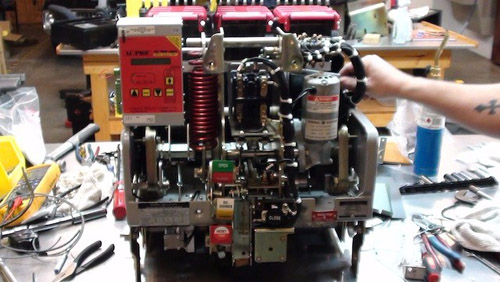
This circuit breaker maintenance training course provides an overview of power system protection design fundamentals, focusing on medium and high voltage power distribution electrical circuit breakers used in common industrial, commerical and institutional applications. Basic electrical circuit breaker construction, electrical safety, and common circuit breaker maintenance techniques are the major components of this course.
The testing and maintenance training part of the course will discuss application, installation, maintenance and testing issues related to low, medium and high-voltage switchgear and electrical circuit breaker equipment. The course will provide delegates with a solid understanding of Circuit Breaker testing and maintenance standards. The course will also make delegates aware of issues concerning the proper application, installation and maintenance of circuit breaker equipment with a strong emphasis on safety. The course will cover a wide range of material starting from the basics and moving on to more complex issues.
When brought on-site, this course can be supplemented by an in-depth study of the specific circuit breaker models used at the client's facility. Hands-on training is provided wherever practical.
Students will learn safe and proper maintenance, testing and safety procedures for servicing a variety of Low Voltage (750V and less) circuit breakers. Topics for Low Voltage circuit breakers will include maintenance and adjustment requirements, as well as insulation resistance, contact resistance and high current primary injection tests.
Students will learn safe and proper maintenance, testing and safety procedures for servicing Medium Voltage (750V – 7.5kV) circuit breakers.
Technically we can include breakers in the MV range of 750-69kV. Most MV services are 12-25kV but Utilities will use up to 38k-69kV that at least we categorized as MV. HV starts at transmission voltages above 69kV and usually was of SF6 GIS equipment breakers include maintenance and adjustment requirements, as well as insulation resistance, contact resistance, high potential and power factor testing. We can provide full reference to a NETA standards and documents here as these are very detailed and inclusive, and publically available
Learning Objectives:
This course is recommended for skilled trades, supervisors, and anyone involved in the design, installation, testing and maintenance of electrical protection systems and industrial power circuit breakers.
Circuit Breaker Design, Testing and Maintenance
DAY ONE
Session 1: Circuit Breaker Protection Fundamentals
Session 2: Review: Types of Circuit Breakers
Session 3: Circuit Breaker Maintenance And Testing
Session 4: Circuit Breaker Maintenance And Testing Fundamentals
Session 5: Circuit Breaker Maintenance Terminology
DAY TWO
Circuit Breaker Maintenance And Testing
Session 6: Circuit Breaker Components
Session 7: Low Voltage Circuit Breaker Testing and Maintenance
Session 8: Standard tests for Medium Voltage and High Voltage Breakers (with live and dead tank design)
Session 9: Electrical Safety Procedures
COURSE TIMETABLE
Both days:
Start: 8:00 a.m.
Coffee Break: 10:00 a.m.
Lunch: 12:00 noon
Restart: 1:15 p.m.
Finish: 4:30 p.m.